- Home
- Wendell Berry
A Place on Earth Page 2
A Place on Earth Read online
Page 2
She reaches out for the letter and takes it. Mat knows she is looking at him, but he does not look at her. And he knows when she looks away from him. She tears open the envelope and reads the letter, and lays it slowly and flatly down on the table, indicating that Mat should read it. And Mat reads it, and then, as though the duty falls to him, he reads aloud: "Virgil Feltner ... missing in action."
Nettie closes the oven door and turns around. She says "Oh" very quietly, her mouth holding the shape of the sound. "He ain't dead."
"No," Margaret says.
Mat hears Ernest going up the stairs to his room.
Hannah has not moved. She sits staring out the window, her hands lying quietly on the piece of white material folded in her lap. Mat picks up one of her hands and holds it, awkwardly because she doesn't respond. Her hand remains passive for a moment, and then she squeezes his and gently takes her hand away. She has not looked at him.
"It may not mean a thing," he says.
"No."
And Margaret reads the letter and puts it back on the table. She takes up the hem of her apron and wipes her eyes. Mat lays his hand on her shoulder.
"Wash up," she says. "It's nearly ready."
Mat washes, and goes and sits down by the front window in the living room. He opens the paper, but looks at it without reading.
As if obeying an instinct, he has done what he usually does. But his eyes only follow the print of the page without reading; the headlines are a black strict architecture; he cannot, somehow, bring himself to assent to a meaning in the words. He folds the paper and moves over to sit on the sofa. Out the window the rain strikes and splashes on the black road.
The sounds become more brisk and rapid in the kitchen. Mat can hear Hannah setting the table. Ernest is in his room at the back of the house above the kitchen; now and then his crutches thump across the floor. Presently Hannah comes in and sits on the sofa beside Mat. She holds up her sewing for him to see. It is a small white gown, delicately embroidered with white thread.
Mat touches it with his fingers. "It's going to be a mighty dressed-up baby."
"Oh, you're going to be proud of this baby."
"I am. I know it."
She folds the dress and turns and looks at Mat, smiling. "Tell me what you did this morning."
And he tells her, the calm of his voice uncertain at first, contradicted by his effort to keep it calm. He was busy all morning with the cattle, he tells her. The cows are calving.
Virgil would be pleased to hear about the calves. But he does not speak of Virgil.
The Card Game
"Uncle Jack," Mat says, "it's your play."
Old Jack draws an ace from the deck, and with a large avoidance of looking either at his hand or at the card slaps it into the discard pile; and Mat, who holds two aces in his hand, decides he will wait until his next turn to pick it up.
The four of them have been there since the early afternoon. The rain by now has dried out of their coats, which have been spread carefully over the back of a wooden bench under the windows. They have, as usual, a fire going in the stove; as usual, except for Old Jack's occasional fits of swearing, they have played pretty much without talking.
By now the card game in the empty store has become an institution, a kind of unnamed club that in the years since its beginning has acquired a fairly stable membership and meeting time. The habit of gathering there in the afternoons began in the late winter of 1941-42 with Mat Feltner and Frank Lathrop. The two of them had been neighbors and friends as long as either of them could remember. In the last thirty or forty years their friendship had led them in and out of perhaps a dozen business partnerships of one sort or another-the latest being the joint ownership of the old building in which, only a year before the war, Frank's son had opened a general store.
But in the early weeks of the war, after their sons had gone into the service, their friendship changed from a casual fact to a necessity. Their talk stayed offhand and easy, but it was conditioned now by the presence of the war, the uncertain nature of their involvement in it, their sense of helplessness before an immeasurable fact. The silences they had always allowed to occur comfortably and simply between them were complicated now by the recognition that there were concerns too grievous for talk. They came to speak to each other with a kind of gentle vigilance, surrounding their conversations with sensitive boundaries, but also with a deepening need to speak.
In those first weeks of the war, after the tobacco had been marketed and they had begun the long and relatively idle wait for spring, they had taken to walking down to the store in the afternoons. It comforted them to build a fire there in the back room and sit and talk.
For a while they went on the pretext of seeing what would have to be done to maintain the building duringJasper's absence, and what improvements ought to be made when he came back. "When and if he comes back," Frank said cautiously only once. And after that they left jasper's name out of it. In spite of their avoidance of his name they both knew that he continued to be implicated in all they said. Any consideration of the future of the store became intricately a consideration of jasper's future, of the future and outcome of the war, of what would be lost. Something would be lost, was in the process of being lost, and they dreaded to ponder what. Their talk had become an obscure dealing with fate. It made them nervous.
But by that time jayber Crow, the town's barber, had begun coming to the store to sit and talk with them. Port William, Jayber said, provided a short supply of heads to barber, and an even shorter supply of heads that could make a satisfactory connection between a service rendered and a promise to pay, so he might just as well be talking.
"You might just as well," Frank told him.
"If you can abide the company," Mat said.
"I'll do you the kindness," Jayber said, "of not judging."
In the afternoons he fastened to the knob of his shop door a battered paper clock which, because of the looseness of the hands, announced perpetually that he would be back at six-thirty; in consideration of the obtuseness of Port William heads he felt obliged to make no further explanations. "Hair's my business. Let it grow"
Jayber's presence made the gathering permanent. There was an air of permanence in his idleness, his long body stretched in a straight line from the back of his tilted chair to the edge of the seat to where his shoe heels bracketed on the rim of the sandbox under the stove, his fingers laced behind his bald head. He would come and sit as long as they would stay, talking for the love of company and the love of talk. It was Jayber who brought the deck of cards.
So the rummy game is a creature of the war, shaped in the suspension of action, the suspension of all certain knowing, that the war has imposed on them. It came about almost by nature, they feel. They know it by its presence, which holds them there in the afternoons from the end of autumn to the beginning of spring, allowing them a dependable silence, masking and comforting them in the solitude of their fears. They are waiting-for the war to be over, for whatever resumption will take place at the end of it.
A Dream of Absence
When dinner was over Nettie set the table again for Joe Banion and herself. Ernest put on his jacket and lit a cigarette and went back to the shop.
Now Mat has come back into the living room. He takes his shoes off and lies down on the sofa. He lies on his side, facing the window, his left arm bent back and propped against the pillow beside his head, his right arm resting across his hip, the hand dangling. He no longer thinks of where he is. He looks out the window, near sleep. The stillness of his hands comforts him. Out the window he can see the yard fence blind with honeysuckle, and above it the roof and white steeple of the church. The branches of the trees in the yard thatch across the steeple, the green shutters of the belfry under it. At the top of the sash a single bead of water swells and drips; the bead grows heavier, touches the point of the steeple, breaks; the drops, blown one at a time against the window, streak down, twisting the steeple, holding its whitenes
s against the glass.
The rain falls harder, the wind blowing it in against the window. The water beads and streaks over the whole pane, the sound sheeted and vibrant there, the rain striking and flaring, blurring the light. The steeple crumbles, its white and green held, with the black of the trees, in shivering transparent smears in the square of the window.
The surface of the water stirs when the wind stirs, ripples barring the reflected blue of sky with the green of water. Several blue dragonflies hover and dart over the pond and in the cattails at the pond's edge, their transparent wings blurring the hard shine of the sun. The mud at the edge of the water is pocked with cow tracks, covered in places with a thin green skim of algae; in places it has begun to dry and only the earth in the cups of the tracks is wet. It is early afternoon. The sun is high. There are no clouds. The sky is hot and brittle, a vast sheet and splintering of blue light turning the eyes down. White and yellow and blue butterflies have lighted on the wet mud; their wings open and close slowly, mottling the light. The pond is at the center of a large field where Queen Anne's lace and daisies are in bloom. The air is heavy with the noises of insects, the hot pungent spices of weeds. The wings of the butterflies open and close over the dark mud.
Mat sees the whole field circling the shimmering round blink of the pond, dipping down to the wet banks. He is aware of the tense articulation of white translucent petals around the yellow eyes of the daisies, the green smooth grassblades under which the ants traffic in a frail crosshatching of shadows.
It is the middle of the afternoon. The shadows have lengthened and become intricate over the banks of the pond. The steeple of the church points whitely up over the horizon of the field. He expects Virgil shortly.
The yellow butterflies all fly up at once. They whirl and flurry in the air a moment and settle back onto the mud in a single movement like one small animal lying down.
The cattle come down to drink, wading out shoulder deep in the water. They drink leisurely, pausing to lift their heads and look at him. Flies swarm over their red backs. Mat can smell the water, the sharp cool mud-smell of it stirred up from the bottom. The cattle wade out again, slowly, muzzles and bellies dripping, hooves sucking out of the deep mud, and climb the bank. He watches them graze into the field. He can hear the grass tearing. It is late in the afternoon.
Virgil has not come. Mat suddenly is afraid. He calls, "Oh, Virgil!" but the sounds will not leave his mouth.
A Departure
He sits up, his throat tight with the unuttered sound of his voice. The suddenness of the movement makes him dizzy, and he sits motionless for a few minutes on the edge of the sofa, stiffened and weighted with sleep. He is still very near the dream, its colors and sounds continuing in his waking, his mind still caught in the abrupt fear that ended it. The house is quiet. He rubs his hands over his face, pushing his hair out of his eyes, and picks up his shoes and goes down the hall to the kitchen.
When he comes through the door Margaret looks around and touches her lips with her finger.
"Hannah still lying down?"
"Yes." Margaret turns back to her work. "This is going to be hard on her."
Mat walks over and stands beside Margaret, putting his arm around her. "On us too. But we can't help it."
"Yes."
They stand without speaking for a minute. Then, "What're you making?" Mat asks.
"Some chocolate pies. Bess and Wheeler and the boys are going to be here for supper."
Mat smiles at her. "Well, I'm glad they're coming for supper. And I'm glad we're having pie." He laughs. `And they'll be glad too, I expect."
"The boys will."
He pulls a chair away from the table and sits down to put on his shoes.
"You slept."
A little."
Mat goes into the hall to get his hat and coat off the rack and comes into the kitchen again. "I'm going to town a while."
'All right."
He goes out and turns down the street towards the store. It is raining still, and he walks with his head bent.
He is already in front of Jasper Lathrop's store when he sees Nathan and Burley Coulter standing in the shelter of the little porch roof over the entrance to the drugstore. The soldier and his uncle stand there watch ing the rain fall onto the road. It will be some time yet before the bus comes, but they seem to have no intention of going into the drugstore to wait, as if now that Nathan's departure has begun they will do nothing to interrupt it. Nathan's brother Tom has been dead two years, killed in the war. As he looks at them, that death seems to Mat to be somehow implicit in their waiting.
Pausing, his hand on the doorlatch, Mat speaks to them.
They turn their heads. Burley raises his hand. "How are you, Mat?"
"Hello, Mr. Feltner," Nathan says.
"Well, are you leaving, Nathan?"
"Yes sir."
"I wish you luck," Mat says, and regrets the words, which seem to him to say both too much and not enough.
They thank him. He opens the door and goes in.
Rain, Rain
The rain slackens, falls loosely and waveringly for a moment, and stops, but after a few minutes begins again suddenly and more heavily than before. It is only after this renewal, when the familiar rattle on the roof has steadied again in their hearing, that they become aware that the drip from the gutter never stopped.
Jayber Crow looks up, frowning, at the top of one of the windows. "Why don't you all fix that gutter?"
"Did once," Frank Lathrop says. "She sprung again."
"Why in the hell don't you fix it?" Old Jack says.
"It's a weary old tune," Jayber says. He speaks to nobody, the tone of objection gone out of his voice, as though nothing was said before.
"If you ever owned a gutter it'd be leaking."
None of them replies. Old Jack's most casual observation is apt to take the form of a final judgment-which could be considered an insult if anybody wanted to take the trouble. They know better than to take the trouble. Though the old man is willing for his remark to be taken better than halfway as a joke, they know that he himself takes it more than half seriously. Jayber owns his barber shop, but it is a fact that he does not own a gutter. It is Old Jack's theory that a man who owns a roof ought to own a gutter, and a cistern to conserve the water, and livestock to drink at the cistern.
They hear the street door open, the slapping of rain against the wet pavement coming abruptly into the building, and then slam shut.
"Whds that?" Old Jack asks, speaking to Jayber again because he is still looking at him.
"Burley, I imagine."
They sit with their heads turned, listening to the approach of Burley's footsteps, the sounds distinct and clear in the hollowness of the larger room, as though he bears toward them his own portion of its emptiness.
He stops in the doorway, leaning his shoulder against the jamb. He grins at them. The brim of his misshapen felt hat, weighted by the rain, bends over his eyes.
"Gentlemen."
"Looks like rain," Frank Lathrop says.
Burley nods. "I look for it."
He shakes the water off his hat and leans there, creasing and smoothing the crown of it with his fingers, burlesquing his care. He watches their faces, prolonging his interruption of the game while he elaborates the joke of his concern for his hat.
"Looks like a man who could afford a ten-dollar hat for a ten-cent head," Jayber Crow says finally, "could afford an umbrella."
Burley stares at him, his face nearly expressionless, but with enough attention that it seems he shapes and completes the silence he allows to follow Jayber's remark, as delicately as he now holds the perfected shape of his hat.
"It looks like to me," he says then, "a two-bit barber with no hair ought to be more respectful of heads."
He puts his hat on, nudging it a little toward the back of his head with his thumb, a gesture that seems both to finish the quiet and detach him from it.
"Well, Burley," Old Jack sa
ys, "is the boy gone?"
"He's gone."
Burley unbuttons his jacket and comes into the room. He shakes the ashes out of the stove and puts in a lump of coal, and spreads his hands to the warmth. He shivers. When his hands are warm, he turns his back to the stove.
"Burley," Mat says, "you might as well play."
They make room and Burley pulls up a chair.
They play without talking-two more hands, and into a third. Mat pushes his glasses up on his forehead, rubbing his eyes, and turns to look out the window.
"Rain, rain."
"The river'll be out of its banks," Frank says.
"Is now," Burley says. 'A little. It could get troublesome."
"Well, I've seen it rain," Mat says, "and I've seen it get troublesome."
"You've seen it worse than it is now," Old Jack says.
"Several times."
`And if you don't die you'll see it worse."
"I expect."
Jayber plays, and Frank, and Burley.
Old Jack draws and slaps down the ten of diamonds and rams his final card into the discard pile. He looks triumphantly from one of his opponents to another.
He has played his ten of diamonds on Jayber's seven, eight, and nine of hearts, but they choose not to notice his error, knowing what it would cost them to try to undo it. Once the old man has committed himself to a play, the rules, as far as he is concerned, no longer apply to it.
I Can Do It by Myself
Old Jack is difficult. When the mood strikes him he can be magnificently difficult.
For nine years after the death of his wife the old man stayed alone on his farm and kept house for himself. But then, because his health seemed to her to be failing, his daughter insisted that he come to Louisville to live with her. He refused. She insisted that he hire a housekeeper; a man his age ought not to be left alone, she said. He refused again, and this time put himself to pains to see that she retreated with her plans and opinions thoroughly dismantled.

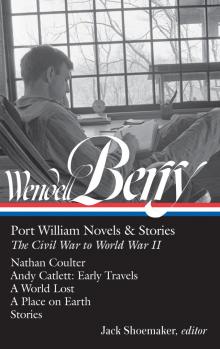 The Selected Poems of Wendell Berry
The Selected Poems of Wendell Berry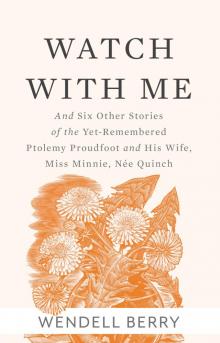 Watch With Me
Watch With Me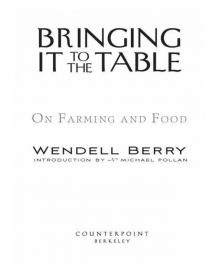 Bringing It to the Table: On Farming and Food
Bringing It to the Table: On Farming and Food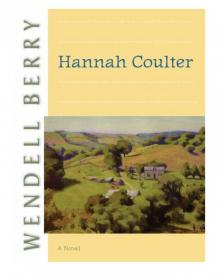 Hannah Coulter
Hannah Coulter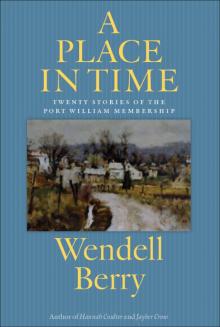 A Place in Time: Twenty Stories of the Port William Membership
A Place in Time: Twenty Stories of the Port William Membership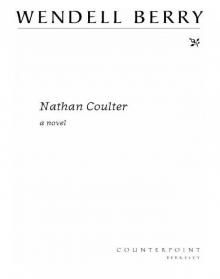 Nathan Coulter
Nathan Coulter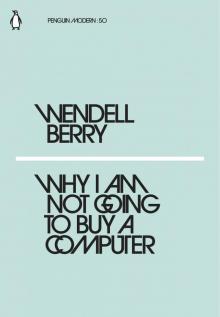 Why I Am Not Going to Buy a Computer
Why I Am Not Going to Buy a Computer A Place on Earth
A Place on Earth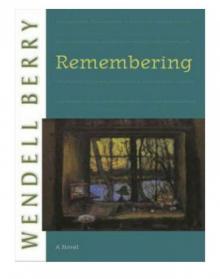 Remembering
Remembering New Collected Poems
New Collected Poems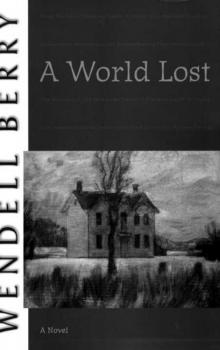 A World Lost
A World Lost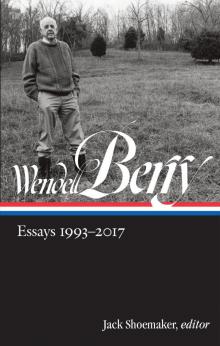 Wendell Berry
Wendell Berry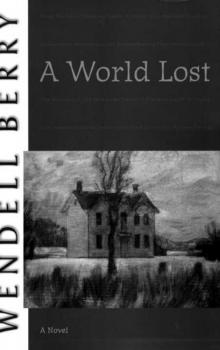 A World Lost: A Novel (Port William)
A World Lost: A Novel (Port William)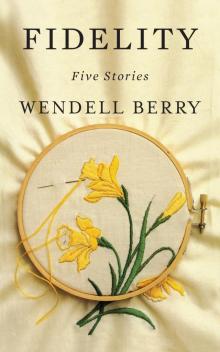 Fidelity
Fidelity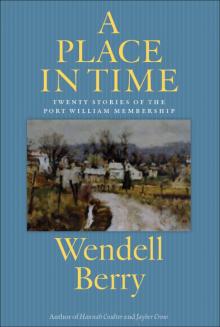 A Place in Time
A Place in Time